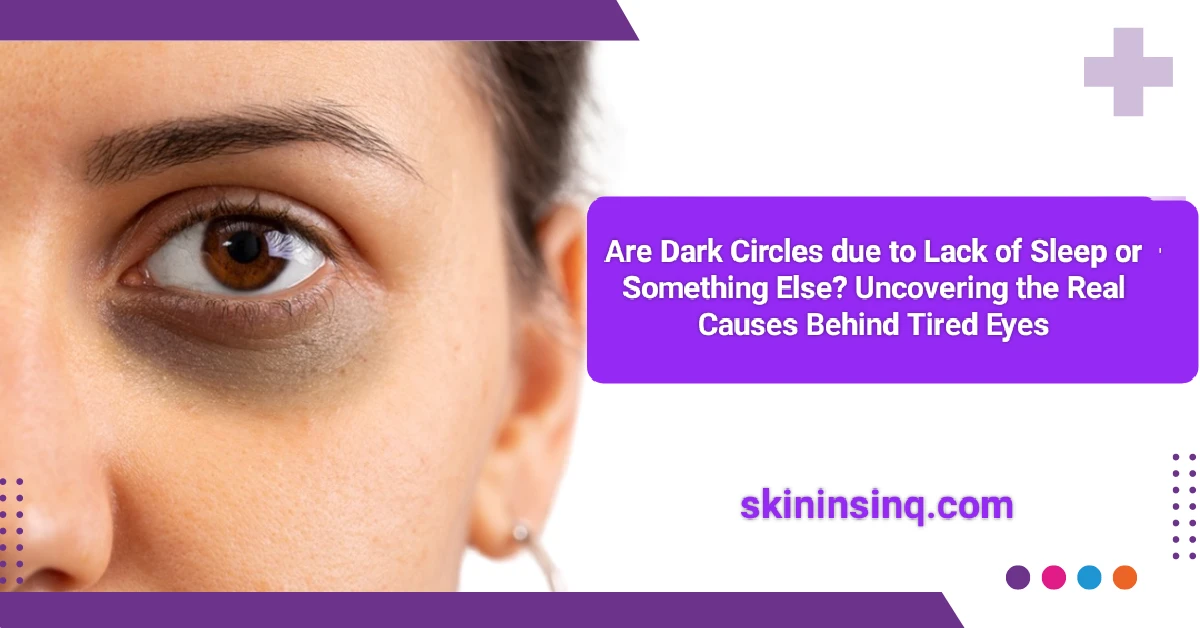Are Dark Circles Due to Lack of Sleep or Something Else? Uncovering the Real Causes Behind Tired Eyes
Are Dark Circles Due to Lack of Sleep or Something Else? Uncovering the Real Causes Behind Tired Eyes
Dark circles under the eyes are often blamed on poor sleep — and while that’s a contributing factor, it’s far from the only one. In reality, dark circles can result from a variety of causes, including genetics, lifestyle habits, and underlying health or skin conditions. Understanding what’s really behind those persistent under-eye shadows can help you manage or even reduce their appearance more effectively.
Sleep Deprivation: A Common but Not Sole Culprit
Lack of sleep can definitely make dark circles more noticeable. When you don’t get enough rest, your skin can appear dull and pale, allowing blood vessels and darker tissues under the eyes to stand out. Additionally, sleep deprivation may cause fluid to accumulate under the eyes, creating puffiness that casts shadows — making circles look even darker.
However, if your dark circles persist despite getting enough rest, sleep alone may not be the root issue.
Other Major Causes of Dark Circles
1. Genetics and Skin Structure
Dark circles often run in families. If you have a genetic predisposition to thin under-eye skin, visible blood vessels, or hyperpigmentation, you may naturally have a darker appearance in that area. Hollow tear troughs — a structural feature under the eyes — can also cause shadows that resemble dark circles.
2. Pigmentation
In people with darker skin tones, excess melanin production around the eyes can cause hyperpigmentation. This is especially common in individuals of South Asian, Middle Eastern, or African descent. Prolonged sun exposure can also worsen pigmentation in the under-eye area.
3. Allergies and Eye Rubbing
Allergic reactions can trigger the release of histamines, which may dilate blood vessels and cause inflammation or swelling. Frequent rubbing of itchy eyes can damage capillaries and cause blood to pool under the skin, creating a bruised or dark appearance.
4. Aging and Skin Thinning
As you age, your skin loses collagen and fat, particularly under the eyes. Thinning skin and loss of volume make blood vessels more visible, contributing to the dark circle effect. Aging also deepens the natural hollows under the eyes, which can cast shadows.
5. Dehydration and Poor Circulation
When your body is dehydrated, skin under the eyes can appear dull and sunken. Poor blood circulation in that area can also cause blood to pool, giving the skin a bluish or purplish hue.
6. Lifestyle Factors
Smoking, alcohol consumption, high-sodium diets, and chronic stress can all impact blood flow, hydration, and skin health — all of which can worsen the appearance of dark circles.
Conclusion
While sleep deprivation can certainly make dark circles more noticeable, it’s rarely the only cause. Genetics, pigmentation, aging, allergies, and lifestyle factors all play significant roles in the development of dark under-eye circles. To effectively address the issue, it’s important to identify the specific cause in your case — whether it’s a lack of sleep, sun damage, or something else — and tailor your skincare or medical approach accordingly. Consulting a dermatologist can help you get a more accurate diagnosis and treatment plan for long-term results.

Related Blog
What Causes Oily Skin and Can It Be Managed Naturally? Exploring Root Causes and Gentle Solutions
Aug 2, 2025 by Admin
General
What Are the Signs That You Have Sensitive Skin? Key Symptoms to Help You Identify This Delicate Skin Type
Aug 1, 2025 by Admin
General